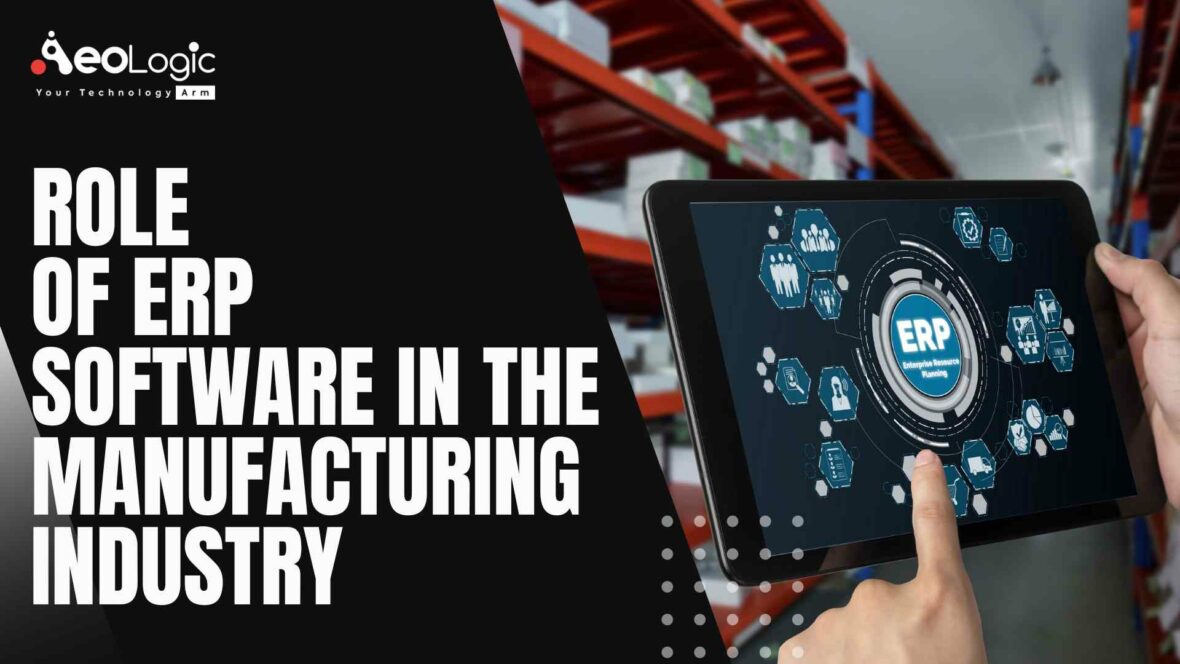ERP software is a Software package designed to provide a centralized system for business. ERP systems are used in almost every industry. The ERP software solution is used to manage the production and distribution of goods, automate operations and provide reports on performance. There are many different types of industrial companies, and each one has a unique set of needs when it comes to software. In this article, you will discover the role of ERP software in manufacturing industry.
ERP Software has proved to be a boon for Manufacturing Industry. ERP is being increasingly used in business, especially Manufacturing Industry, as it helps in many ways.
Also Read: The Role of Technology in Disaster Management
Introduction
Role of ERP software in manufacturing providing a platform for managing all aspects of the business, from product development and planning to sales and customer service. By integrating all departments and functions into one system, ERP software provides a real-time view of the entire operation, which is essential for making informed decisions and responding quickly to changes in the marketplace.
In addition to streamlining operations, ERP software can also help manufacturers reduce costs by automating many of the tasks that are traditionally done manually. For example, ERP software can generate purchase orders automatically based on sales forecasts, track inventory levels in real-time, and create production schedules that take into account available resources and customer demand. By using ERP software to automate these tasks, manufacturers can free up their employees to focus on more value-added activities such as new product development or quality control.
Finally, ERP software can also help manufacturers improve their customer service by providing them with the information they need to resolve customer issues quickly and efficiently. For instance, if a customer calls with a problem, an agent can use the ERP system to pull up the order history, identify the issue, and find a resolution quickly. This type of responsive customer service is essential for building long-term relationships with customers.
Role of ERP Software in Manufacturing Industry
ERP software is a comprehensive and integrated enterprise resource planning system that helps organizations manage their business processes in an efficient and streamlined manner. It enables the automation and integration of various core business functions such as accounting, finance, supply chain management, manufacturing, customer relationship management, human resources, and others.
The implementation of ERP software in the manufacturing industry can help organizations achieve a number of benefits including better visibility into their operations, improved decision-making capabilities, enhanced customer satisfaction levels, reduced costs, and improved efficiencies. In addition, ERP software can also help organizations keep pace with the ever-changing market dynamics and meet the challenges posed by globalization.
Also Read: How Digitalization Will Change The Future of Business Technology
Role of ERP Software in Manufacturing
The role and benefits of enterprise resource planning (ERP) software are many and varied, but can be broadly divided into three main categories:
- Improved efficiency and productivity
- Increased visibility and control
- Enhanced decision-making
Improved efficiency and productivity: By automating and streamlining key business processes, ERP software can help businesses to operate more efficiently and effectively. This can lead to increased productivity across the organization, as well as reduced costs.
Increased visibility and control: ERP software provides managers with real-time visibility into all aspects of the business, from finances to inventory levels. This allows for better decision-making and greater control over the business as a whole.
Enhanced decision-making: With all of the relevant data at their fingertips, businesses can use ERP software to make more informed decisions about strategic planning, marketing campaigns, product development, etc. This leads to a more agile and responsive organization that is better able to adapt to change.
Types of ERP Systems
There are different types of ERP systems available in the market. Some of them are:
- SAP Business One: It is an affordable and easy-to-use ERP software designed specifically for small and medium businesses. It provides a complete view of your business by integrating all core departments such as sales, finance, operations, inventory, and customer service.
- Oracle E-Business Suite: It is a comprehensive ERP software suite that offers a wide range of enterprise applications such as financials, human resources, supply chain management, and project portfolio management.
- Microsoft Dynamics NAV: It is a powerful ERP system that helps small and medium businesses manage their finances, supply chain, and operations effectively. It also provides integration with Microsoft Office 365 and Power BI for better productivity.
- Infor CloudSuite Industrial (ERP): It is an enterprise resource planning software designed specifically for manufacturing companies. It helps manufacturers manage their finances, supply chain, production, quality control, and other core processes efficiently.
Also Read: Role of Information Technology in Industry 4.0
Pros and Cons of ERP Systems
Enterprise Resource Planning (ERP) systems are a popular choice for manufacturing companies looking to streamline their operations and improve efficiency. However, ERP systems come with both advantages and disadvantages that should be considered before making a purchase.
PROS:
- ERP systems can help manufacturing companies optimize their production processes by providing real-time data on inventory levels, production schedules, and machine utilization. This information can help managers make more informed decisions about where to allocate resources.
- ERP systems can also improve communication and collaboration between departments within a manufacturing company. By sharing information across departments, ERP systems can help reduce errors and duplication of effort.
- In addition, ERP systems can provide comprehensive reporting capabilities that give managers visibility into all aspects of the business. This information can be used to make better strategic decisions about the direction of the company.
CONS:
- One of the main disadvantages of ERP systems is the high upfront cost of purchase and implementation. Manufacturing companies need to be prepared to invest both time and money into an ERP system before they will see any return on investment.
- Another disadvantage of ERP systems is that they can be inflexible once they are up and running. If a manufacturing company wants to make changes to its processes or add new functionality, it may need to purchase an entirely new ERP system.
- Finally, some manufacturing companies may find that they do not need all the features offered by an ERP system. For example, a small company may not need the same level of reporting and analysis as a large company. In these cases, it may be more cost-effective to purchase a less comprehensive system.
Also Read: How Machine Learning Can Improve Supply Chain Efficiency
Conclusion
ERP software is an important tool for the manufacturing industry. It helps companies to manage their resources and production processes effectively. ERP software can also help companies to improve their communication and collaboration with suppliers and customers. By using ERP software, manufacturers can streamline their operations and increase their efficiency.
Since growth never stops and instead accelerates, more emerging trends will definitely appear in 2022 and beyond. So, let’s all consider the best course of action for moving forward with ERP software.
Feel free to schedule a free 60-minute consultation with one of our experts. We’ll talk about the opportunities and address any concerns you may have. Our consultants will suggest solutions and outline how they can be implemented. Let’s talk!
Aeologic Technologies is a great place to start!
Also see: Our RFID Solutions
Also Read: 10 Ways to Use Artificial Intelligence to Improve Business Processes Related Blogs:
- How AI/ML Can Change the Public Transportation Industry
- Transforming Business With Digital Technology in the Oil Palm Industry in India
- Importance of Digital Asset Management in the Retail Industry
- How AI is Transforming the Agriculture Industry
- 10 Ways to Use Artificial Intelligence to Improve Business Processes
- The Future of IoT Technology in Convenience Stores
- Building Manufacturing Resilience Through AI and ML






